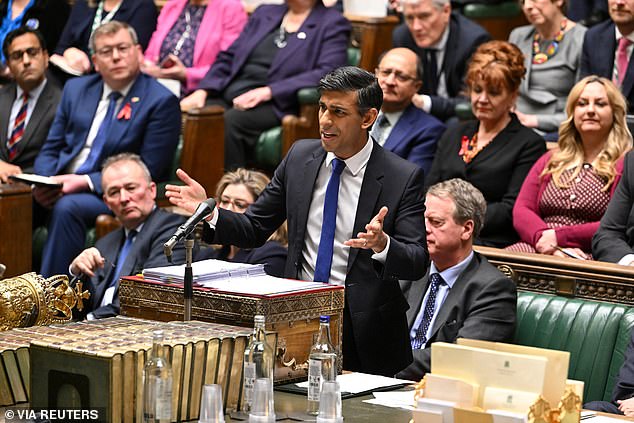- The OECD urged ministers in the UK to water down the pension promise made
- Jeremy Hunt confirmed the policy will be honoured in full in Autumn statement
Calls to scrap the state pension triple lock to pay for net zero policies by the Europe-based OECD yesterday triggered fury on this side of the Channel.
The Organisation for Economic Co-operation and Development urged ministers here to water down the pension promise.
The proposal was immediately slapped down by Downing Street, which said the Government is ‘very clearly committed’ to the triple lock.
Chancellor Jeremy Hunt confirmed in last week’s Autumn Statement that the state pension triple lock policy will be honoured in full next year. Campaigners and charities said it was vital to keep the triple lock, which guarantees the annual rise in the state pension.

Rishi Sunak’s (pictured) spokesman said: ‘You have got the Government’s commitment to the triple lock, as the Chancellor set out very clearly just last week… I think the Government is very clearly committed to it’
And former pensions minister and This is Money columnist Steve Webb said: ‘It’s none of the OECD’s business.
‘We don’t need their opinion on that, and the OECD of all people should know that the UK still has one of the lowest state pensions in the western world and the triple lock is a mechanism for doing something about that.’
Caroline Abrahams of charity Age UK, said it is ‘absolutely essential the triple lock stays’.
‘It’s the only policy we have that enables the millions of pensioners on low and modest incomes to keep their heads above water – without it many would have been well and truly sunk in recent years,’ she said.
Morgan Vine of charity Independent Age, said the state pension triple lock was vital for protecting the ‘often dangerously low income’ of millions of older people. She said one in eight retirees rely solely on the state pension and benefits for their income.
Under the triple lock, the state pension rises by wage growth, inflation or 2.5 per cent – whichever is higher. The OECD suggested that the policy could be reformed by linking annual pension rises to an average of inflation and wage growth, rather than by the highest rate.
The pension will enhance by 8.5 per cent in April, taking the headline full rate weekly payment to £221, Mr Hunt confirmed last week.
Rishi Sunak’s spokesman said: ‘You have got the Government’s commitment to the triple lock, as the Chancellor set out very clearly just last week… I think the Government is very clearly committed to it.’
According to yesterday’s OECD report, pension spending will hit 0.8 per cent of gross domestic product by 2027/28, costing around £25billion.
The OECD, an intergovernmental organisation based in Paris, said decarbonisation policies will cost 0.5 per cent of GDP – or £14billion a year – by 2030.
It said loss of fuel duty with the switch to electric cars will cost the Treasury 0.4 per cent of GDP, or £11billion annually. Reform of the triple lock could free up cash to spend on green initiatives, the OECD said.




